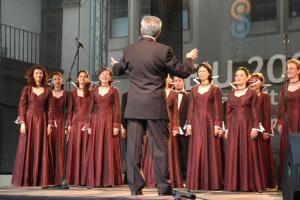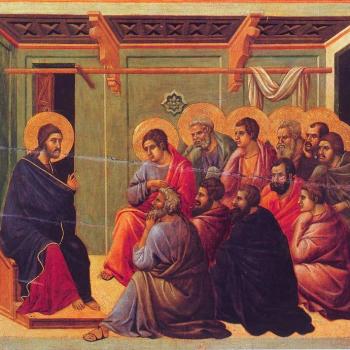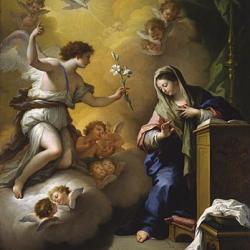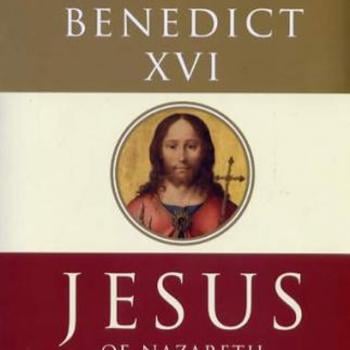Everyday busy Catholic writers are typing words that they hope others will read, savor and devour. I like to browse these thoughts, pick out some nice tidbits, tie them up together in a blog article with a big bright bow and distribute them for others to gaze upon and reflect upon. In the first few weeks of December and Advent, here is what Catholics are Writing Right Now. Glance through and maybe you will read or watch something that sticks in your heart, mind, and soul.
Cross and Crib
The incarnation was not an illusion. Jesus did not pretend to be mortal and vulnerable. God became truly human. Jesus shares fully and completely in our human condition, including its tragedies, betrayals, and injustices. “Sorrowing, sighing, bleeding, dying”—these are not all that it means to be human. But for many, if not most of us, these are inescapable realities that we must endure.
Just as the cross looms over the crib, so does the light of resurrection shine upon it. The resurrection is God’s assurance that tragedy and death are not the final realities of the human condition. These are not God’s will. In raising Jesus from the dead, God shows that human beings are summoned to work to struggle against the horrors and afflictions that trouble so many. God vindicates the healing and saving ministry of Jesus and shows us that his way of being human is the pattern for our lives as well.
FATHER BRYAN MASSINGALE This Christmas, remember that the cross looms over the crib –(November 28, 2022) U.S. Catholic (uscatholic.org)
Did You Raise Your Kids Right?
We have kids who want to spend Christmas playing medieval Celtic music because they’re nostalgic for a simpler time that may or may not have existed hundreds of years before they were born, and we also have kids who want to play Mario Kart all day because they just unlocked new levels or something, and Rainbow Road doesn’t cause nearly as much neurological damage as it seems. We have kids who want to reenact the Nativity story with their Montessori-approved wooden figurines, and kids who consider the Mr. Bean version, with the dinosaurs and the helicopters, to be an essential part of the Gospel. And I will be honest, the Gospel of Mr. Bean just about tided me over last year, when one of my other kids didn’t even show up, because she wasn’t talking to us at the time.
And I raised them all the same way! I tried so hard with every one of them, and they all turned out different, because they are who they are. They do have virtues, all of them. Just not necessarily the ones I tried to arrange for or the ones I immediately recognized the value of. That’s how it goes. That’s how people are.
How to deal with family chaos at Christmas (December 11, 2022) (oursundayvisitor.com)
Doubt
We all, at times, encounter something in scripture or Church teaching that bothers us. The question then becomes, what needs correction – scripture/tradition or me? Depending on how you respond to this fundamental distinction you will find yourself in the company of either orthodox or modernist elements within the Church.
-Brian Holdsworth, (December 13 at 6:09 PM) Facebook
Evolution
One of the most important things to remember when we consider evolution is that God is omnipotent, omniscient, and has all of the other perfections we read about in the Baltimore Catechism. He loves us and wants us to understand the natural world that He gave us to steward. He doesn’t try to fool us. No loving parent does that.
God also possesses patience that astounds us. Look at how long He waits for sinners to return to Him and how He loves variety and leisure! Yes, He sometimes goes outside the laws He created for nature and does things quickly to make a significant point. The miracle at Fatima was outside the normal laws, and it was a great grace.
However, God usually works slowly and predictably within the laws He Himself made. Sounds like evolution. When we study the details that we know about the living world, we see that they are truly astounding and enthralling. God’s patience exemplified in evolutionary history was an important theme for Fr. Stanley Jaki, a renowned theologian and physicist, a polymath and real genius in multiple academic fields.
In contrast to God, the devil loves speed and efficiency. We see it in the very telling lines given to the devil in the movie Time Bandits:
God isn’t interested in technology. He cares nothing for the microchip or the silicon revolution. Look how he spends his time, forty-three species of parrots. Nipples for men…Slugs. He created slugs. They can’t hear. They can’t speak. They can’t operate machinery. Are we not in the hands of a lunatic?
Dr. Douglas Darnowski A Catholic Defense of Evolutionary Science (December 9, 2022)-Crisis Magazine
Focus on Joy
Joy by definition is the gladness, the satisfaction that appears when our will possesses something which leads to our genuine happiness. Joy is the response of the human heart to what it perceives as an authentic promise of life. And Christ’s Presence is just that!
And here is the wondrous thing about joy: Joy can coincide with sadness—because of the promise joy contains. But,joy cannot coexist with fear! Why do we end up becoming manipulated by fear, surrendering our life’s joy? Because we are no longer anchored by The Promise. We no longer have our gaze fixed on The Promise. As long as we are afraid, we are not looking for love. Instead, when menaced by something, we’re on the lookout for power. Keeping our eyes focused on The Promise is what Advent is all about.
Fr. Peter John Cameron, This is Satan’s only real enemy: Take it seriously 12/10/22 (aleteia.org) OP –
Franciscan Reckoning
As an alumnus of Franciscan University, this is what stings: looking back on those friars in black, the ones who led me to Christ at each daily Mass preaching freedom, conversion, and abundant life in the Holy Spirit—and wondering who was complicit. Who kept turning his eyes. Who was permissive. Who grasped for power. Who else is out there. I think there is a reckoning coming, and I pray for it. I am still waiting for any word from the university to its alumni, the very students who could have been victimized.
f there are friars among the Third Order Regular Province of the Sacred Heart of Jesus with a fraction of St. Francis’ courage and conviction, this is your time, and I believe your founder’s life is replete with examples of how to spend it. It is the time for abject humility and penance, for relinquishing the grasp on accolades and esteem, for standing utterly bare and transparent before the world in order to declare your one allegiance: to Christ and His Truth.
And if instead the friars (and, it follows, Franciscan University) turn inwards—if they seek self-preservation, as we see over and over and over again in this long slog of Church history—then, as we sang so many times in those reverberating Assisi churches and campus itself, Come, Holy Spirit. Let the fire fall. And let it burn.
Elizabeth Hansen Franciscan University and Its Friars Face a Reckoning (April 14, 2021)– Crisis Magazine
Hellish Consideration
The Catholic Church has condemned what is sometimes called strong or hard universalism, the idea that we know that everybody is saved. Perhaps weak or soft universalism may be true, which is to say, perhaps everybody, at the end of the day, just so happens to be saved, though it could have been otherwise. So far as I’m aware, Catholics can maintain the soft or weak (or hopeful) universalist view. Whether there are good reasons to is a debate I will not enter now.
In simple terms, the account of postmortem fixity is this: to change our minds, we must either come across new information or consider the information we have from a new perspective. But a traditional understanding of the human person maintains that neither of these conditions attains upon death, when the intellect is separated from the body. In effect, we “angelize” upon death, and the orientation of our will at that point remains thereafter. Nothing “new” or “different” is going to come along to get us to consider things afresh. Although God could perform a “spiritual lobotomy” on everybody who makes the faulty judgment of willing against Gain, God—in his perfectly wise governance—orders things toward their end in accord with their nature. And our nature is one of a fallible liberty—we are free, and we are free to make mistakes, which we do.
PAT FLYNN • You Can’t Have an All-Good God Without Hell (12/6/2022)| Catholic Answers
Helping Others Hear God’s Music
Recently, I was at Mass and had a small moment of clarity: a cloud no bigger than a man’s hand. It was a typical morning Mass during a weekday with a bunch of people characteristically timid about singing. (Catholics are terrible singers as a rule, especially when there is no choir or anybody to direct us.) The lady who normally belted out the intro hymn and recessional was not there that day, so people were sort of mumbling their way through the recessional. As it happened, it was a song I knew pretty well. And since people were mumbling along, I decided I would be the loud one so people would have a leader to follow. Sure enough as soon as there was one voice taking the lead, everybody else pitched in.
After it was over, this lady came up and thanked me and, for a moment, I though to myself, “That’s what I want to do: be the guy who helps people hear the music of God in the world and join in.” (No. I am not going to join the choir. I’m speaking metaphorically.)
Mark Shea I’ve been thinking and praying – (Stumbling Toward Heaven

Hesitating in Calling Someone a Heretic
We must distinguish a difference in opinion on theological, liturgical, or philosophical matters from heresy. It goes completely against charity to call someone a heretic in such cases.
Some things are clearly heretical – like if someone says the Eucharist is only a symbol; or proposes that at the incarnation, the divine and human nature were mixed and changed – but we should be very hesitant to use terms like this on disputed questions. If you are not a theologian, I would recommend against using it for fellow Catholics unless you hear a solid theologian using it. Even we theologians should be cautious and only use it when we are 100% sure and can cite a clear defined teaching a statement goes against.
This is not to discourage debate and discussion. This is not to say you can’t point out where you think someone errs. Just the opposite: I think it encourages discussion; it just keeps that discussion in the realm of truth and charity.
Hesitate Before Saying “Heretic” on Disputed Questions () FrMatthewLC
Hope and Poets
Sometimes it takes the poet to remind us that metaphors and similitudes employed in the scriptures and in the Christian tradition are precisely that: parables and symbols drawn from human experience that give us rather concrete and arresting ways of speaking of spiritual realities. It is the poet who can break open again our native tendencies to harden our metaphors, to take them with a seriousness that only betrays their original purpose.
Hope is indeed the trust that tomorrow can be different than today, that the mechanisms of today can become life-giving organisms tomorrow. The child knows this intuitively, but we forget it with age, just as we forget the value of sleep, of night, of abandoning ourselves, our work, our light, to the abyssal darkness of a God who crowns his creation by resting, and who invites us, during Advent above all, to enter into his rest. After all, the light of tomorrow, when the sun rises and receives the praise of all humanity, when it is raised up anew as God’s created herald in the world, will bring with it new anxieties. But, given how much we praise the day, the tomorrow, we should trust that tomorrow will be perfectly capable of worrying about itself.
December 09, 2022) Church Life Journal | University of Notre Dame
Hope in a Dark World
Increasing Vocations
Magisterial Thinking
Popes and the ordinary Magisterium have formulated the truths of the faith using a diversity of theological frameworks available to them. The beauty of the Magisterium is that it brings together multiple theological elements that provide a more complete picture of the faith within any age, especially through the deliberations of an ecumenical council. Nevertheless, the character of those teachings often bears the character of the popes who presided over the promulgation of those teachings. Hence, if one reads the encyclicals of Pope Leo XIII, they are unique in their Leonine character from, say, the encyclicals of Pope Pius XII, and different still from Pope St. John XXIII, or Pope Benedict XVI. To employ a principle of biblical exegesis, the popes are human authors, leaders and theologians, who rely not only on the guidance of the Holy Spirit, but their own theological experience and formation.
The challenge for Catholics, however, is how to read these teachings faithfully and in a spirit of humility. If we happen to function within a similar theological paradigm as that of the current pope, we will find it easier to agree with his teachings. They resonate with us. Yet when a pope employs elements of a different paradigm, or shifts the paradigm, it can create dissonance and even deep fear and resistance. One might even become suspicious of their motives, especially when their approach appears to represent a sharp departure from their predecessor.
MICHEL THERRIEN The Hermeneutics of Discontinuity (DECEMBER 7, 2022)– Where Peter Is ·
Mary’s Yes
Mass Sharing
Burdens shared are halved, just as joys shared double the happiness. We should know this from the Mass, from the reality of all the pews filled with people carrying silent crosses that would otherwise crush. The graces that come from sharing the readings and the songs and the Body and Blood of Christ allow each of us to share even if we do not know the reality or each other’s names, in each other’s lives — and help place our paralyzed souls before the Lord.
When we leave, our souls have at least one thread woven to each of the other souls that participated in this and every Mass, and all the souls in Heaven who celebrate with us. This is a comfort to all of us, to know that all of Heaven prays with us and takes our worries and our crosses to Christ. He delights in being our Savior, in using these sufferings and trials to reveal both his deep love for us, and our faith to the world, so as to invite more souls to trust his love.
Sherry Antonetti On Suffering and Hope and Forever (December 5, 2022) National Catholic Register (ncregister.com)
Mysterious Jesus
Matthew’s Gospel is not always user-friendly. Personally, I prefer the intimacy of Luke, the action of Mark and the poetry of John. In Matthew, we get a Jesus who is constantly talking in knotty, confusing parables, offering nuggets of rabbinical wisdom that aren’t always easily grasped. Instead of a straightforward Jesus, Matthew’s Jesus is a person we have to work to figure out. He is, in other words, a mystery. When people ask why I’m still Catholic, that’s the reason. Catholicism, for all of its flaws, has room for mystery.
Kaya Oakes Our faith allows for mystery. That’s why I’m still Catholic. (December 09, 2022)| America Magazine
Moving On
As I get older and approach the possibility of my own death with all sorts of projects uncompleted, hopes and dreams unfulfilled, and various wounds unhealed, the more it makes sense to me that some people could die locked into being consumed by such unfinished business. So I can certainly imagine certain personalities, particularly enormously strong-willed or addictive ones, getting “stuck” and unable to move on to the good God wills for them in the next life just as they can often get stuck even in this life.
It may be that part of the good the communion of saints does for us might involve drawing us onward at the hour of our death and breaking the grip of earthly obsession with unfinished business. At any rate, I think if my darling Janet pre-deceased me, desire to see her again would be a powerful sacramental grace–perhaps the last grace of the sacrament of marriage–in dislodging me from getting stuck on That Book I Never Finished or That Relationship I Never Healed or whatever else it was that got me stuck on earth and unable to move on. The love of the saints may be the solvent that frees us from unhealthy ties to the past and helps us com further up and further in.
Mark Shea Ghosts (December 7, 2022) – Stumbling Toward Heaven
Never Give In
Singing
Singing is one of the most important things we do as humans. Some have suggested that humans are best described as homo canens, the singing man. In many civilizations, singing and music place us close to the heart of being, especially as a way of communing with God. Throughout the Bible, Israel offers her praise and thanksgiving by singing. Think of the Hebrew people after passing through the Red Sea. Think of King David and his Psalms. Just as the Psalms shaped Israel as a people, songs form individuals into a people and shape their national destinies. Have you ever wondered about the uniting effect of song and how the resonance of singing or mood creates unity among many? Even the bodies of the singers resonate as one with the song, bringing the various voices together around a unifying purpose. Just listen to Beethoven’s Ninth Symphony with the text of Schiller’s “Ode To Joy” on hand, and you will see what I mean. It’s as if the song brings the people to a culminating destination or purpose. Hopefully, I do not overstate the salvific influence of music, but I am inclined to think it may be a way of helping to heal our growing cultural fragmentation. Perhaps it can be understood like a sacrament in that music, when done right, attunes us to God.
ROBERT MIXA United in Song: The World Cup, Christmas Carols, and the Cosmos –(DECEMBER 1, 2022) Word on Fire
Thoughts on Preaching about Sin
In a confused society, of course, mitigating circumstances can exist which reduce the guilt of those who fall into all the culturally-championed sins. My point is not that the Church should make it a standard pastoral practice to condemn sinners, for we are all sinners, including all the Church’s ministers. But it ought not to be too much to expect that the ministers of the Church will speak clearly about sin, and all the more clearly about those particular kinds of sin which are denied by the dominant culture in which we suffer so much deprivation of truth and so great a habitual obstruction of grace. It ought not to be too much to ask that the ministers of the Church along with all well-formed Catholics should speak clearly and decisively against especially the most prominent and frequent sins in our society, a society which is, after all, even commercially built largely upon impurity.
Dr. Jeff Mirus The refusal to preach purity in the face of sexual license (Dec 06, 2022)| Catholic Culture
Truth About TLM Shutdown
Vatican 2 Worldview
One determinative doctrine of the Church in particular helped to set the program of reform and renewal in the Council. It is the doctrine of the imago Dei, the revelation that every person bears the stamp of God’s image and has the infinite dignity that goes with that. Also, that human personhood is essentially relational, given that the God in whose image we are made is in fact a dynamic community of persons – a Trinity. Our selfhood is therefore constitutively implicated in the lives of other selves. We exist to be in solidarity with them. What this insight gave the Council, to put it in hermeneutical terms, was a horizon of assumptions and values which shaped its concrete insights and judgments about the world. A new worldview, precisely.
The opening pages of Henri de Lubac’s magisterial book Catholicism (first published in 1938) effectively prefigures all of this.[5] Drawing heavily on the Fathers of the Church, de Lubac emphasizes that the supernatural dignity of baptized Christians rests on the natural dignity of all of humankind. Also, that the unity of the Church supposes a prior unity of the whole human race. You can’t have one without the other. And both rest on the doctrine, which first appears in Genesis and is never far from the pages of either Scripture or the early Fathers, that all persons were made “in the one image of the one God” and that “the divine image does not differ from one individual to another.”
DERMOT ROANTREE The worldview of Vatican II (DECEMBER 12, 2022) – Where Peter Is ·

















